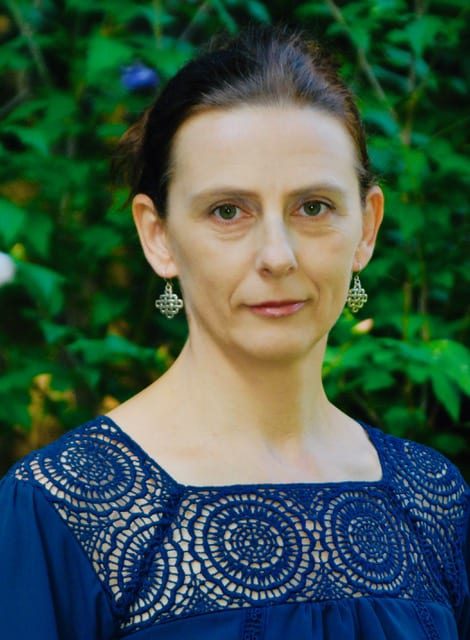The Association for the Advancement of Baltic Studies is pleased to announce that Ausra Park has been awarded the 2023-2024 Baumanis Grant for Creative Projects in Baltic Studies.
The Baumanis Grant is an award made to honor Velta Marija Baumanis of Mount Brydges, Ontario, who left a generous bequest to AABS at the end of her career as an architect. An award of up to $7,000 is available for any creative project (e.g., book, film, exhibit, etc.) that promotes Baltic studies. Preference is given to topics with a pan-Baltic or comparative aspect. Applicants must be members of the AABS at the time of application.
The 2023 applications were evaluated by the AABS 2022–2024 Grants Committee consisting of AABS VP for Professional Development Dr. Kaarel Piirimäe, AABS President Dr. Dovilė Budrytė, and AABS Director-at-Large Dr. Daunis Auers, and AABS Treasurer Uģis Sprūdžs, CFA.

© Ausra Park
Ausra Park is a Professor of International Relations in the Department of Political Science and International Relations at Siena College in New York, USA. She is a recipient of several prestigious awards and research grants, national and international fellowships and scholarships, including from the Department of State Title VIII program, the German Marshall Fund of the U.S., IREX, ACTR/ACCELS, the Flemish Government, and the French Ministry of Foreign Affairs as well as competitive institutional grants for research and pedagogy.
Dr. Park’s work on top political leadership, small post-communist states’ foreign policies, women’s political leadership, gender in diplomacy, comparative foreign policy, small states’ status seeking, nation-branding, migration, and human trafficking in post-communist Europe has been published in top ranking scholarly, peer-reviewed journals: The Hague Journal of Diplomacy, Europe-Asia Studies, Journal of Contemporary European Studies, East European Politics, and Demokratizatsiya: The Journal of Post-Soviet Democratization.
Presently, Dr. Park is working on two academic projects: a manuscript tentatively titled Titans of the Baltic States: The First Generation of Foreign Policymakers and Their Legacies, and she is also conducting field research for a book project that examines the rise and legacies of the first women presidents in Eastern Europe (case studies of Latvia, Lithuania, Kosovo, Croatia, and Estonia).
Project Abstract
Election of the first female head of state is a transformative event in the history of any country. Arguably, the advent of the first woman president connotes that the public’s views of “who belongs” in high politics are changing. Although other women’s “firsts” in politics are unquestionably important historical milestones—especially when women are first elected as political party heads, prime ministers, or speakers/chairs of parliament—none of these political “firsts” match the significance and symbolism of having the first woman head of state.
Political historical works focusing on presidential offices have shown that presidencies in many countries are granted the highest status in institutional hierarchies; that these offices often carry high visibility; and, most crucially, that presidencies entail formal constitutional powers providing office holders with duties and responsibilities in foreign affairs. Therefore, when a woman breaks the highest political “glass ceiling” for the first time in country’s history, her presence and gender result in powerful “ripple” effects signaling not only women’s arrival to, and representation in, politics, but also women’s role in, and impact on, national and global affairs.
With the dawn of the new millennium, women presidents have become a “new political normal” in Eastern Europe. This longitudinal transnational comparative project examines symbolic and substantive gender representation effects that the election of the first women presidents in the post-communist Europe have had so far (focusing on concluded presidencies in Latvia, Lithuania, Kosovo, Croatia, and Estonia). I explore the presence (or absence) of gender(ed) effects that the election of the first women presidents may have had on the Eastern European post-communist states, evaluating how much these first five women presidents had advanced a feminist agenda and women-friendly policies.
I also seek to ascertain whether the presence of a woman president has in any way changed the public’s perceptions about women’s leadership at the national level, and whether the cracking of presidential “glass ceilings” in these countries has created a new “normal” resulting in a larger share of women entering politics and a greater women’s empowerment.
Additionally, for the first time in a scholarly work, I apply political psychology methodology developed and widely used in American presidential politics field to examine East European women presidents. In doing so, I will unveil and analyze the impact that their childhood, adulthood, formative years’ socio-economic background, presence/absence of political mentors and/or role models, and life/work abroad has had on presidents’ worldviews.
Finally, based on personal interviews with the presidents, their advisors, and academics conducted during fieldworks over the summers of 2022-2024, as well as hundreds of secondary sources I examined, I seek to ascertain their individual effects on the presidential offices, their countries’ political environments, and the post-communist region itself as well as stipulate on the legacies these first women presidents have left behind.
I am convinced that this pioneering project, which I plan to publish as a book, on the first East European women presidents will be a valuable addition and a substantial contribution to the disciplines and literatures on gender politics and representation, presidential studies, and pan-Baltic/European area studies. Furthermore, given the comparative nature of this study, which focuses on the Baltic and Balkan women presidents, the book will shed light on, advance our knowledge, and contribute scholarly insights to the rapidly growing subfields of women political leaders and gender in chief executive studies.
-Ausra Park
Ausra Park
